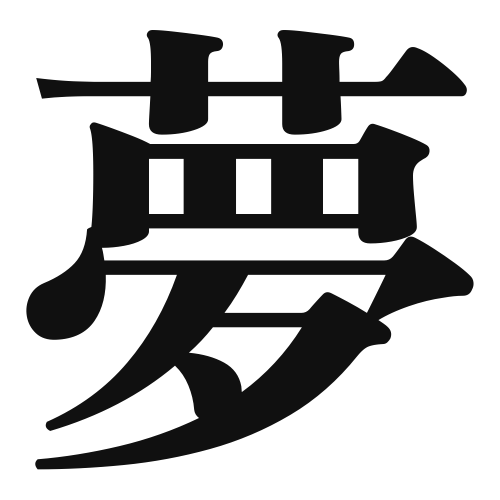1. Overview of Meaning
The kanji “夢” (yume) means “dream.” It refers to the experiences and images that occur in our minds while we sleep, as well as aspirations and hopes we have in our waking lives.
2. Formation and Radicals
The kanji “夢” is a compound character (会意文字) that combines two elements: the radical for “eye” (目) and the character for “dream” (夕). This suggests the idea of seeing something at night, which aligns with the concept of dreaming.
The radical of “夢” is 目, which means “eye.” This radical is often associated with vision and perception.
3. Examples of Usage
Common words and phrases that include “夢” are:
- 夢見る (yume miru) – to dream
- 夢中 (muchuu) – absorbed in a dream or passion
- 夢想 (musou) – daydream or fantasy
Example sentences in daily conversation:
- 昨夜、面白い夢を見た。(Sakuya, omoshiroi yume o mita.) – I had an interesting dream last night.
- 彼の夢は宇宙飛行士になることです。(Kare no yume wa uchuuhikoushi ni naru koto desu.) – His dream is to become an astronaut.
4. Synonyms and Antonyms
Similar kanji with related meanings include:
- 幻想 (gensou) – illusion or fantasy, which implies a more unreal or imaginative aspect compared to “夢.”
- 希望 (kibou) – hope, which refers to a desire for a certain outcome, often related to aspirations.
Antonyms include:
- 現実 (genjitsu) – reality, which represents the actual state of things, contrasting with the imaginative nature of dreams.
5. Cultural and Historical Background
In Japanese culture, dreams hold significant meaning and are often seen as messages from the subconscious. They can be interpreted in various ways, and some people believe that dreams can predict the future.
Common proverbs and idioms related to dreams include:
- 夢は見るものではなく、叶えるものだ。(Yume wa miru mono de wa naku, kanaeru mono da.) – Dreams are not just to be seen, but to be realized.
- 夢中になる (muchuu ni naru) – to be absorbed in something, often used to describe being deeply engaged in a passion or hobby.
